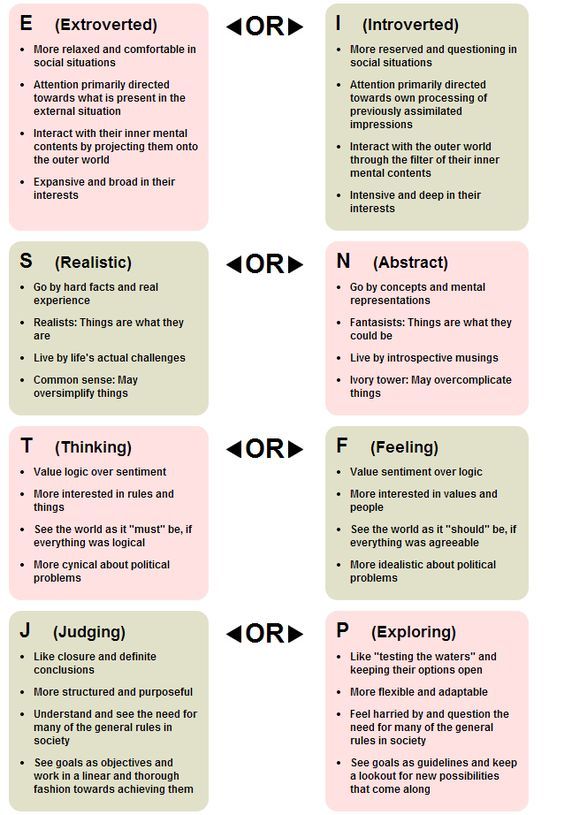Overcoming self sabotaging
5 steps to change your behavior
Jump to section
What is self-sabotage?
Identifying self-sabotage
The psychological impact of self-sabotage
How to stop sabotaging yourself
If you’re reading this article, chances are it’s for one of two reasons. Either you have a sneaking suspicion that you’re getting in your own way, or someone has pointed out a pattern of behavior that you don’t particularly like.
No one wants to admit that we sabotage ourselves, but we all do it to some degree. Everyone has done things that took them out of step with a goal that they’re trying to achieve or behavior that they want to change. That’s okay — when we’re aware of it.
When we’re not aware of our self-sabotaging behaviors, life can seem impossible. We can feel like we’re playing a game where we don’t understand all the rules. It may seem like we’ll never achieve the goals we want or live the kind of life we want to have.
When you’re trying to create a change in your life, it’s helpful to look at what you can control, rather than what you can’t. Fortunately, your behavior is something that you can change. Learn how to identify unhelpful patterns and how to stop self-sabotaging in this article.
What is self-sabotage?
The term sabotage means to deliberately damage, block, or impair something so that it doesn’t work as intended. Even though we rarely block ourselves deliberately from getting what we want, we still might do or say things to get in our own way. To others, it can even seem deliberate.
What does it mean to self-sabotage?
Self-sabotage is when people do (or don’t do) things that block their success or prevent them from accomplishing their goals. It can happen consciously or unconsciously. Self-sabotaging behaviors can affect our personal and professional success, as well as our mental health.
Although we usually talk about self-sabotaging behavior, it’s also possible to have self-sabotaging mindsets and patterns. Becoming aware of what causes self-sabotage is key to breaking these patterns.
What causes self-sabotaging behavior?
In the book Stop Self Sabotage, Dr. Judy Ho explains self-destructive behavior as a biological response. We get a boost in dopamine (the feel-good neurotransmitter) by setting goals. But when it’s time to complete them, the fear of failure triggers avoidant behavior. In order to avoid the “threat,” we subconsciously start to shy away from our goals. This is called the approach-avoidance conflict.
Self-sabotaging happens when there’s a mismatch between our values and our behavior. It’s most likely when we have to either do something that doesn’t align with what we really want. Conversely, it might be that we know what we want but do something that doesn’t help us get there.
Let’s look at a couple of examples:
Example A
Your doctor tells you that you should start an exercise program. That’s great, but you hate going to the gym. Knowing this, you sign up for a gym membership and sessions with a trainer, figuring the extra accountability will keep you motivated. On the first day of training, you arrive at the gym twenty minutes late — and without your sneakers.
On the first day of training, you arrive at the gym twenty minutes late — and without your sneakers.
Example B
You’re often late to work, so you make a plan to start waking up at 6:00 am. That evening, you stay up watching TV after dinner. You rationalize that whatever you haven’t finished can get done in the morning. Unfortunately, you oversleep. Waking up late throws off the rest of your day. You’re so groggy, you think “See? I’m just not a morning person.”
In each of these examples, our behaviors are out of alignment with what we say we want to see happen. When this kind of mismatch occurs, we have to either change our behaviors or develop greater self-awareness.
Self-sabotaging behaviors are also linked to cognitive dissonance — the psychological discomfort associated with internal contradictions. When we try to make ourselves do something that isn’t in line with our beliefs or values, we feel out of balance.
Subconsciously, we often try to restore this balance by changing our behavior (or creating circumstances, no matter how sneaky, that let us off the hook).
Identifying self-sabotage
There are many different patterns associated with self-sabotage. One of the most essential steps in identifying self-sabotaging behavior is to develop self-awareness. Self-awareness, or introspection, is critical to noticing unhelpful patterns of behavior and strengthening the ability to stop them in their tracks.
A helpful way to begin identifying forms of self-sabotage is to frame your situation using the following sentence:
“I want to achieve (goal), but I keep doing (behavior).”
For example, I might say “I want to get a passport, but I keep missing the appointment.”
Now that I’ve identified the behavior and how I keep blocking it, I can start to look for other areas where that behavior might show up. For example, I might realize that I often miss doctor's appointments as well, or never put passport appointments on my calendar.
Once you start asking yourself these questions, you’ll start to notice your patterns (and they might arise in more than one area of your life).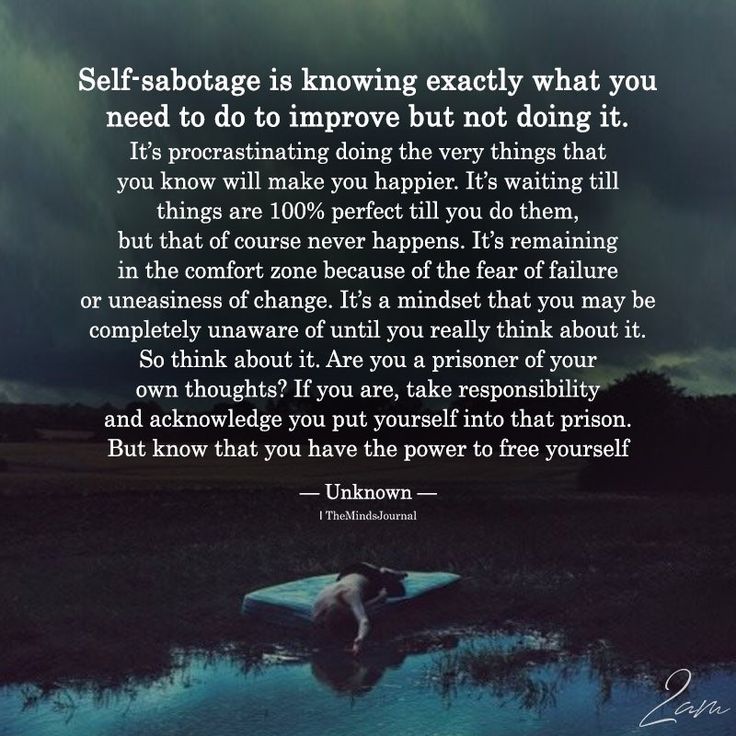 Here are some of the most common patterns of self-defeating behavior:
Here are some of the most common patterns of self-defeating behavior:
1. Perfectionism
Striving to be perfect might sound like a good thing, but it often gets in the way of being effective. Perfectionists often struggle with getting started on projects — and when they do get started, obsession with the details keeps them from finishing.
Perfectionists also tend towards all-or-nothing thinking. They tend to be especially harsh on themselves and talk themselves out of potential opportunities before they even get started.
2. Moderation
People who struggle with moderation often have difficulty setting boundaries. This behavior might look like people-pleasing (which causes them to say “yes” to too many things. Or it might be a lack of moderation in other areas of their lives, like one too many drinks on a night out.
There are other, more subtle ways of “overdoing it,” like staying up all night watching TV or working out to exhaustion at the gym. Although overcommitting can look like a strong drive to achieve, it often masks an underlying fear of success.
3. Running on empty
Have you ever heard the fable about the goose that laid the golden egg? The owner was tired of only getting one egg per day, so they cut the goose open to get them all (it didn’t work out that well). Neglecting your personal needs to try and get more done isn’t just shortsighted — it’s a sneaky sign of self-sabotage.
4. Procrastination
Everyone’s guilty of procrastinating now and again, especially when it’s a project they don’t really want to do. But putting off your responsibilities can actually indicate a lack of self-confidence. When you procrastinate, you prevent yourself from having the time and the resources you need to do your best work.
Procrastination often goes hand in hand with perfectionism. Perfectionists will often delay starting a project if they feel they can’t do it perfectly.
5. Lack of communication
You know you need help on a project, but you don’t reach out. You’re running late, but decide not to send a text.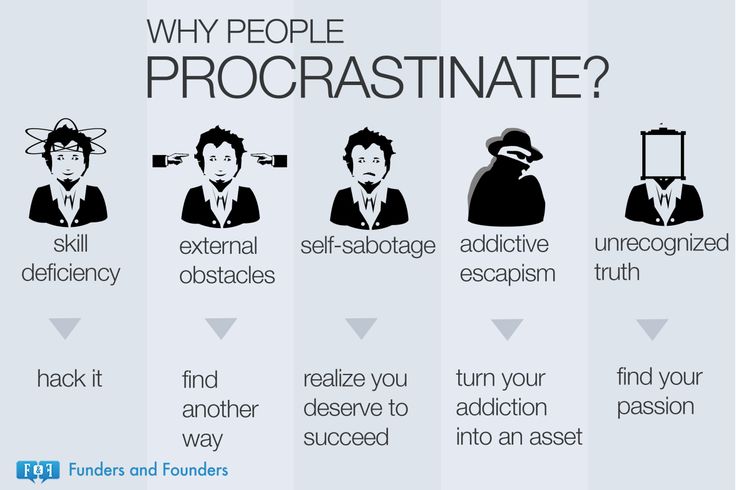
Communication is a regular part of our lives, both in and out of the workplace. When we resist communicating, it’s often due to self-criticism. We worry that by asking for help, we’re highlighting our failures.
Unfortunately, the lack of communication can be damaging to our relationships. Even worse, it can create fertile ground for impostor syndrome. Because no one knows what you’re dealing with, you live in fear of being “found out.”
Symptoms of self-sabotage
The signs of self-sabotage can be very subtle. Here are some common ways people self-sabotage — both at work and elsewhere:
- Refusing to ask for help
- Controlling or micromanaging behavior
- Picking fights or starting conflicts with colleagues and loved ones
- Setting goals that are too low or too high
- Avoiding or withdrawing from others
- Negative self-talk and extreme self-criticism
- Making excuses or blameshifting
- Undermining your goals and values
- Substance abuse, overspending, or “overdoing it” in other ways
- Constantly seeking approval
- Reluctance to speak up for yourself
The psychological impact of self-sabotage
When we’re not aware of our negative thought patterns and how they affect our behavior, self-sabotage can run our daily lives.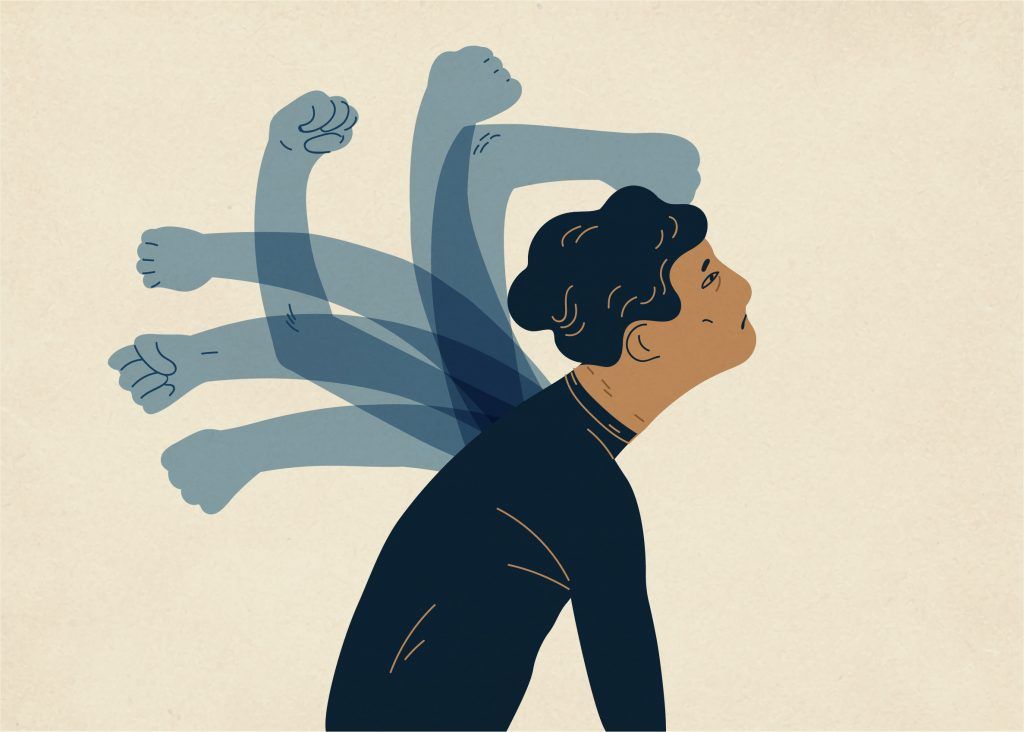 We might feel hopeless about the future or achieving our goals. We may think that there’s something wrong with us and that we’re just not capable of success.
We might feel hopeless about the future or achieving our goals. We may think that there’s something wrong with us and that we’re just not capable of success.
When this happens, these negative behaviors can become ingrained. They can amplify our insecurities. Self-sabotaging behaviors drain our motivation, enthusiasm, and self-esteem. Because the evidence of our “failures” starts to pile up, we no longer think we’re good enough.
This self-doubt begins to perpetuate a cycle. When we’re (inevitably) pushed to do something outside of our comfort zones, we panic. Those uncomfortable feelings and scared inner voices lead us to act against our own best interests. And when it causes us to burn a bridge that really matters to us, it’s heartbreaking.
How to stop sabotaging yourself
Learning to recognize and stop self-sabotaging behavior can help us rebuild our self-image. Here are 5 ways to stop self-sabotaging:
5 ways to stop self-sabotaging
- Develop self-awareness
- Write it out
- Create a plan — and do it
- Practice mindfulness
- Communicate
1.
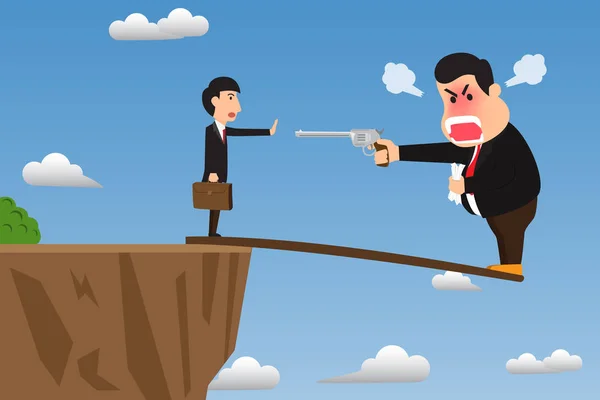 Develop self-awareness
Develop self-awarenessWhat does self-sabotage look like for you? Do you wait until the last minute to start projects? Do you pick fights with others or run away from challenges?
Start your inquiry with the sentence we framed earlier: “I want to achieve (goal), but I keep doing (behavior).” Once you have identified the goal and the behavior that’s “blocking” it, you can start to understand what the negative behavior is actually telling you.
In many cases, self-destructive behavior is rooted in anxiety. Our anxious behaviors can cause us to avoid doing what we need to do to reach our goals. In this case, we’re not avoiding the goal: just the perceived negative consequences of it. That includes the negative emotions we associate with it.
Sound complicated? Let’s look at my example from earlier.
“I want to get a passport, but I keep missing the appointment.”
Digging a little deeper can help us pinpoint what the negative feelings are trying to say. What happens? Well, I say I want to get the passport, but I never put the appointment on my calendar. That’s a good place to start. Why wouldn’t I put an important appointment on my schedule?
That’s a good place to start. Why wouldn’t I put an important appointment on my schedule?
Paying attention to this behavior might help me notice that when I make the appointment, I follow it by doing something counterproductive. Paying attention to my inner voice, I hear myself say “There’s no point in getting a passport, you’ll never get time off to go anywhere. Besides, it’s too expensive.”
This is just an example. But if we slow down the loop, we often find that there’s a sneaky thought that happens between making progress and the unproductive action. In this case, it’s my fear that I won’t have the money or time to travel. Instead of addressing that, I just avoid getting the passport.
2. Write it out
If you’re having trouble identifying your patterns, start by keeping a journal. As you continue to write about your goals, you may start to notice yourself complaining about the same things over and over. Share these thoughts with a coach or therapist. They may be able to help you find ways to overcome them.
Sometimes, self-sabotaging behavior is a result of past or childhood trauma. We might develop survival strategies that keep us from further harm. Unfortunately, when these strategies outlive their usefulness, it becomes difficult to break them. Working with a therapist can help you resolve the underlying emotional pain.
3. Create a plan — and do it
When you pinpoint the behavior patterns you want to break, create a plan for how you’ll address them. For example, if you know that your self-sabotaging thoughts sneak up before you put an appointment on the calendar, decide to put it on anyway. You can make it a personal rule for yourself: “All of my appointments go on my schedule, no matter what.”
By making it a personal rule, you allow the power of habit to take over. This increases the chances that you’ll actually make it to the appointment. But it also gives you a chance to see what else might be in the way for you emotionally.
Taking action is a critical step, since procrastination is often a cornerstone of self-defeating behaviors. Once you start taking action, you build momentum towards your goals. This helps you reduce fear and (re)build your sense of self-worth.
Once you start taking action, you build momentum towards your goals. This helps you reduce fear and (re)build your sense of self-worth.
If you need help getting started, talking to a coach or mentor can provide accountability and support. It can also help you stay energized when making small changes. Perfectionists tend to hate incremental progress, but it’s the surest way to make a change.
4. Practice mindfulness
Self-defeating behavior patterns are often painful to break. They may be coping mechanisms to help you deal with past traumas. Or they may have prevented you from achieving goals that meant a lot to you. Once you start unpacking them, you may see the impact of these patterns on your professional, personal, and romantic relationships.
It’s important to learn to sit with these difficult feelings and be gentle with yourself as they come up. Practicing mindful breathing and meditation is a great idea. Not only can it help you develop self-compassion, but it can help you break down the patterns faster. Breathwork strengthens your ability to stay present, which will help you notice when your inner critic pipes up.
Breathwork strengthens your ability to stay present, which will help you notice when your inner critic pipes up.
You can support this growth by doing Inner Work®, working with a coach, or listening to mental health podcasts.
5. Communicate
In some ways, the last step is both the simplest and the scariest. People who self-sabotage will — paradoxically — do just about anything to avoid drawing attention to their insecurities. Telling people what you’re afraid of might seem like jumping out of the pan and into the fire.
But communicating (even if it’s only a little bit of your mental health journey) can have several benefits. For one, voicing a fear often makes it seem less frightening. For another, sharing your goals helps to build accountability and support.
If your group of friends is anything like mine, telling them that you want to get a passport is bound to generate excitement. Even if you don’t tell them that you’re worried about time or money, you’ll get flooded with cheap weekend getaways. Sometimes, creating a new emotional context for ourselves is just what we need to move forward.
Sometimes, creating a new emotional context for ourselves is just what we need to move forward.
How to stop self-sabotaging at work
Self-sabotaging at work can take many forms. This might include procrastinating, workplace conflicts, or underperforming. Here are some ideas to limit the impact of self-defeating habits at work.
1. Talk to your manager
Ask for feedback and specific areas where you can improve. If you’re struggling with expectations, be honest.
2. Communicate
If you’re concerned about falling behind, speak up. If you need more support, speak up. Whatever it is, staying in communication can help you focus on what needs to be done. The more you speak up, the less scary it will seem.
3. Take a chance
When self-sabotage starts to affect your performance, it can cause low self-esteem. Our self-image, in turn, affects our self-efficacy and whether we feel we can successfully take on new challenges. If there’s an opportunity you want to pursue, don’t let your inner critic talk you out of it. Ask for support as you go for what you want.
Ask for support as you go for what you want.
How to stop self-sabotaging relationships
When we feel unworthy of love and intimacy, we often (unconsciously) push our loved ones away. Uncovering these habits is difficult, but necessary if we want to have positive personal relationships.
1. Put values first
Picking fights, acting out, and lying are common ways that people sabotage personal relationships. We’re less likely to engage in these behaviors when we’re aware of how they conflict with our values.
2. Watch out for red flags
When we have a history of trauma, we can find ourselves reliving the same patterns again and again. This happens sometimes even when we’re consciously trying to avoid it. Learning to recognize red flags in a relationship can signal that it’s time to get support.
3. Work on you
One of the traps of personal relationships is that, well — they’re personal. They can help us grow. But they can also pick at our deepest insecurities unlike anything else can. Continuing to care for your own physical and emotional well-being is important as you strive to understand your own patterns.
Continuing to care for your own physical and emotional well-being is important as you strive to understand your own patterns.
Final thoughts
As you learn more about the different types of self-sabotage (and how they show up), be gentle with yourself. Remember that trying to change too much at once is classic self-defeating behavior.
Working with a coach or mental health professional can be very helpful. It can provide support and accountability as you learn how to stop self-sabotaging and move forward.
How to Stop Sabotaging Yourself
Do you ever find yourself rushing so much that you end up forgetting your cell phone charger? Then it turns out that you’ve got an important call and you spend the entire time feeling anxious about your phone dying?
Or perhaps you’ve decided your romantic partner doesn’t listen to you; so you keep talking more and more trying to hammer home your point. Unfortunately, this leads your partner to tune you out even more, threatening your bond.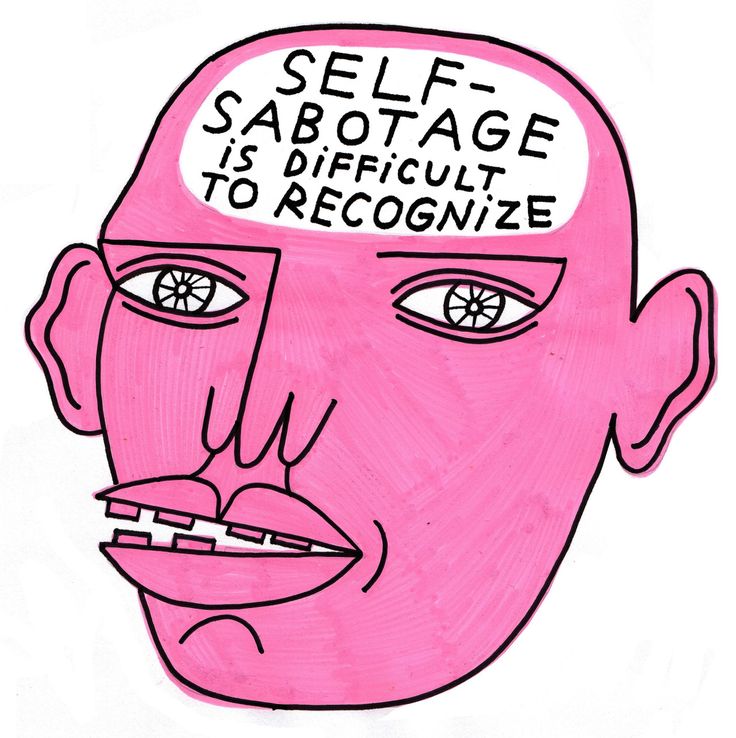
These are just a couple of ways you may be sabotaging yourself and your relationships, creating unnecessary pain and self-generated stress. In my new book, The Healthy Mind Toolkit, I help readers self-diagnose the sabotaging thinking and behavioral habits that are holding them back in life and in love, and provide simple, practical tips for overcoming these patterns.
Advertisement XMeet the Greater Good Toolkit
From the GGSC to your bookshelf: 30 science-backed tools for well-being.
To stop sabotaging yourself, you must first recognize when you’re getting in your own way. Some of the time, we’re acutely and painfully aware of this—like when we find ourselves procrastinating before taking care of a (literal or figurative) mess, so that it becomes a bigger deal to clean up later. Or we impulsively buy a large bag of potato chips when we’re trying to cut back on junk food.
Of course, other times we’re less aware of our self-sabotage or we misdiagnose the core problem. This happens a lot in relationships. For instance, when you’re feeling competitive with the mom of your child’s playdate friend, you may get into a cycle of baiting and antagonizing each other, without recognizing your passive-aggressive interaction style. This gets in the way of you focusing on her great qualities and holds you back from potentially becoming good friends.
This happens a lot in relationships. For instance, when you’re feeling competitive with the mom of your child’s playdate friend, you may get into a cycle of baiting and antagonizing each other, without recognizing your passive-aggressive interaction style. This gets in the way of you focusing on her great qualities and holds you back from potentially becoming good friends.
To stop sabotaging yourself, you need to figure out your patterns of behavior and then find creative ways to counteract them and form new habits. Here are some of the practical strategies I suggest in my book.
Know your typical thinking patterns
Our personality and life experiences predispose us to dominant modes of thinking, but these can be biased in ways that are unhelpful in the majority of situations.
For example, people who are prone to anxiety tend to be hypervigilant to signs of threat, and detect threats that aren’t really there. This happens to be one of my personal patterns of self-defeating thinking. The way this manifests for me is that problems always seem bigger than they really are; whenever anyone asks me to do something, I (internally) overreact and perceive whatever is being asked as more onerous than it is.
The way this manifests for me is that problems always seem bigger than they really are; whenever anyone asks me to do something, I (internally) overreact and perceive whatever is being asked as more onerous than it is.
How do I deal with this? Knowing my thinking bias, I factor it into my judgments. I discount my initial reaction and go back and review requests with fresh eyes. I explicitly say to myself, “My brain is reacting to this as if it’s a threat, when most likely it’s actually an opportunity.”
To moderate your thinking biases, you’ll need to develop a psychologically sophisticated understanding of your own thinking. This is possible with some effort and reflection. Maybe you tend to worry people are angry at you when usually this isn’t the case. Maybe you tend to impose your perfectionistic standards on others and it hurts your relationships. Or you tend to hesitate too much in making decisions. When you thoroughly understand your personal thinking errors, you’ll be able to correct for these, and this will become easier and almost automatic with practice.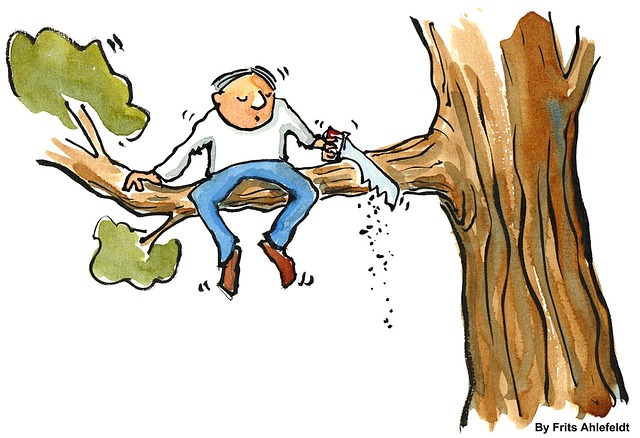
Prioritize one-time behaviors that reduce your stress over time
When you reduce your mental clutter, you’ll have more time and cognitive energy for correcting your thinking and behavioral biases.
In modern life, it’s extremely easy to get into a pattern of being “too busy chasing cows to build a fence.” A very common self-sabotaging habit is thinking we’ll remember to do something but then forgetting. To work around this tendency, you can design aspects of your life with the assumption that you’re going to be imperfect.
This essay is adapted from The Healthy Mind Toolkit: Simple Strategies to Get Out of Your Own Way and Enjoy Your Life (TarcherPerigee, 2018, 304 pages).
For example, if you have a Google Home or the Google voice assistant on your phone, you can say things like “Hey Google, remember I put my passport in the linen cupboard.” You can then simply ask your voice assistant where you put your passport when you need to find it. A less technology-reliant strategy I use is to keep $20 in the glove compartment of my car for the couple of times a year I manage to forget my purse when I leave the house. This backup strategy means that forgetting my purse doesn’t generate stress. I can still buy that day’s essentials—like gas or whatever groceries I need for dinner that night.
A less technology-reliant strategy I use is to keep $20 in the glove compartment of my car for the couple of times a year I manage to forget my purse when I leave the house. This backup strategy means that forgetting my purse doesn’t generate stress. I can still buy that day’s essentials—like gas or whatever groceries I need for dinner that night.
In your work and home life, you can streamline your workflow so you can get simple things done without significant willpower. Tiny changes can help you feel in control. For example, instead of having a container for pens and scissors in only one room of the house, I have these in three different rooms. This makes it much less likely I’ll leave pens lying around, since putting them back after use only involves walking a few steps, rather than going to another room and interrupting the flow of whatever I’m doing. Strategies like these save time and, more importantly, help free you up mentally.
Use heuristics (rules of thumb) for decision making
Decision making is hugely draining—especially if you’re anxious or a perfectionist who overthinks every decision. If you can reduce cognitive fatigue from decision making, you’ll have more emotional energy for other things.
If you can reduce cognitive fatigue from decision making, you’ll have more emotional energy for other things.
One way to do that is to use heuristics—“rules of thumb” aimed at producing a good outcome most of the time with minimal case-by-case effort. For example, to help me prioritize, I use the rule “Do tasks that are worth over $100 before any tasks worth less than $100.” Also, to help me avoid running out of needed items and make faster decisions, I use the rule “If I’m going to run out in less than two weeks, order it online now.”
You’ll need to develop your own heuristics that suit your personality, circumstances, and preferences. For instance, what works for someone who is too hesitant won’t likely be appropriate for someone who is too impulsive. Likewise, since I usually shop with my toddler, “order online” is easier than a rule that adds something to my shopping list to pick up at the store.
Learn to love incremental improvements
A paradox perfectionists face in trying to reduce self-sabotage is their tendency to have inflexible standards and be dismissive of incremental gains.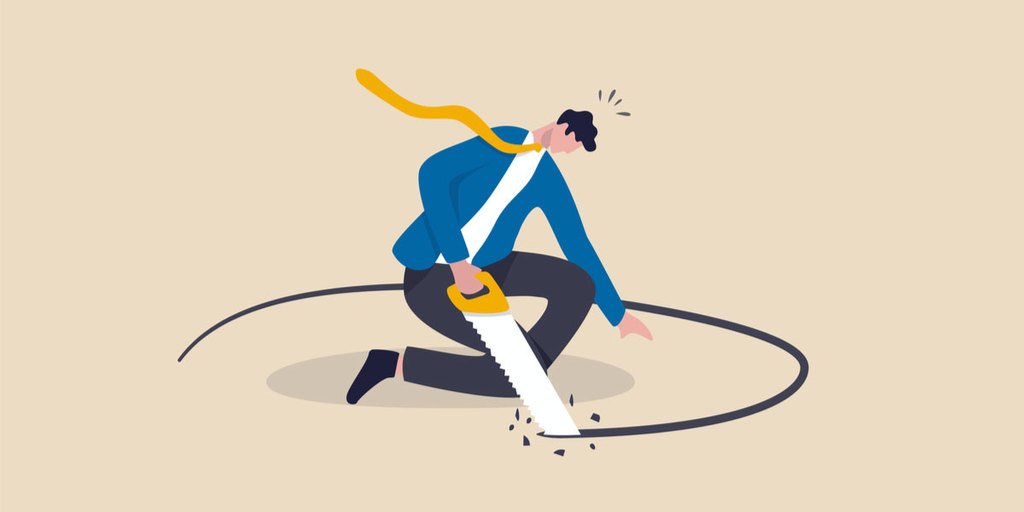 They want to solve a problem completely, right now, and aren’t motivated by solutions that improve a problem by, say, one, 10, or 20 percent—even if these solutions are almost effortless.
They want to solve a problem completely, right now, and aren’t motivated by solutions that improve a problem by, say, one, 10, or 20 percent—even if these solutions are almost effortless.
When you start to appreciate the beauty of making incremental improvements, you’ll see easy solutions that you’d previously been overlooking. Over time, even tiny improvements add up significantly. It can be extremely helpful to ask yourself, “How could I improve this by one percent?” instead of “How can I completely eliminate this sabotaging habit?” For instance, you might ask yourself, “How can I improve my problem of overeating by one percent?”
Use strategies to combat avoidance and procrastination
When we procrastinate or avoid, our anxiety about whatever we’re avoiding tends to increase. Many times, people who procrastinate don’t think to use a strategy for getting started—even though many exist (and are outlined in my book). By identifying your six or seven favorite strategies, you’ll always have one that’s relevant and feels achievable in a particular situation.
Some strategies for getting started include:
- Use project to-do lists to outline every step involved in a particular project. Save your daily to-do list for things that truly need to be done that day. Project-specific to-do lists help you utilize small scraps of time. If you have five or ten minutes, you can do a tiny step from your project-specific list.
- Shrink relatively unimportant tasks to the bare minimum required for getting them done. Perfectionists habitually expand the scope of projects to the point that they become unwieldy.
- Try “last things first.” Sometimes the typical final steps in a task are easier to start with than the typical first steps.
- Pretend you’re going to outsource a task and write the instructions you’d give someone else. This can help you simplify your expectations if your demands of someone else would be more reasonable than your demands of yourself.
The strategies you prefer may change over time, but having a big list to choose from lets you try new ones when the old ones don’t work or feel stale. As your life circumstances change (such as becoming a parent or changing work roles), you’ll likely need to explore new strategies.
As your life circumstances change (such as becoming a parent or changing work roles), you’ll likely need to explore new strategies.
Understand your seemingly irrelevant decisions
“Seemingly irrelevant decisions” is a concept that comes from treatment for addiction. For example, a recovering alcoholic might decide to call an old drinking buddy, just to say hello or for a game of basketball, and soon finds that this minor decision takes them down the slippery slope of resuming alcohol abuse.
You can use this same concept to understand much less destructive, but still sabotaging, behaviors. For example, you might realize that if you start a new task within 30 minutes of when you plan to leave work, it’s highly likely that you’ll leave late. Or, if you’re prone to running late for appointments, you might learn to recognize your sabotaging behavior of answering the phone when you should be walking out the door to be on time.
On the positive side, you can also learn what makes it more likely you’ll do positive, wanted behaviors later.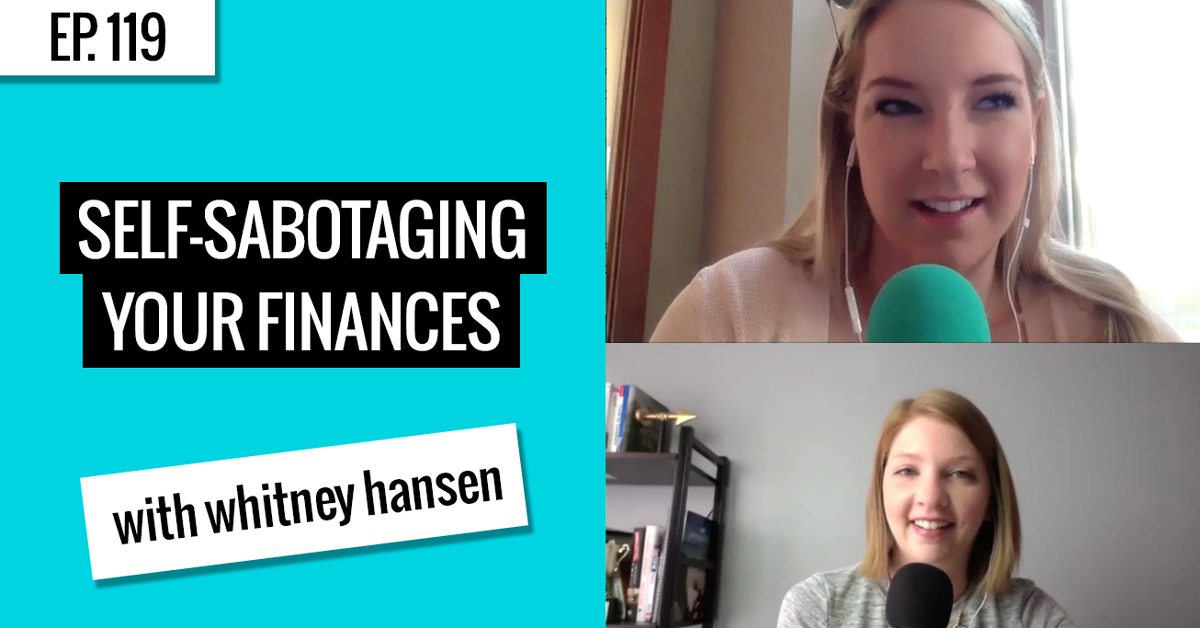 A micro decision for me is whether I leave a document open on my computer when I plan to go back and work on it after taking a break. If I leave it open, I’ll generally go back to it. If I close it, I won’t. It can be very satisfying to understand your own psychology and realize your personal patterns.
A micro decision for me is whether I leave a document open on my computer when I plan to go back and work on it after taking a break. If I leave it open, I’ll generally go back to it. If I close it, I won’t. It can be very satisfying to understand your own psychology and realize your personal patterns.
Practice acceptance and self-care
Making changes in your life requires time and energy. You can’t ask this of yourself if your psychological bank account is already in overdraft.
Sometimes people get into a trap of thinking, “When I’m being more self-disciplined or more productive, then I’ll do more self-care.” But, if you’ve run yourself to empty, try it the other way around: Allow yourself to have more experiences of pleasure before you think you “deserve” them. Otherwise, you’ll continue to run yourself into the ground and engage in self-sabotage.
Another way to free up your cognitive and emotional reserves is to practice acceptance. Ask yourself: What aspects of reality can I accept instead of ruminating on them or nagging others about them? This could be accepting certain traits of your romantic partner, occasional human error, changes at work, or something as simple as your kid liking a food one day and rejecting it the next.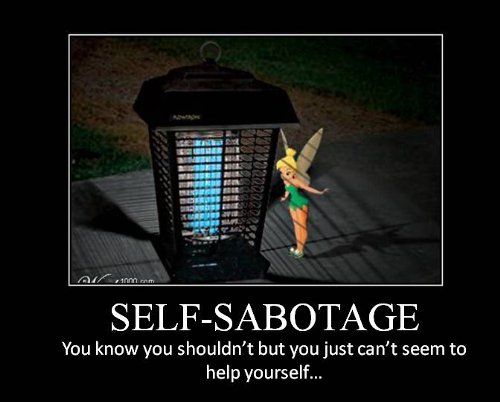 When you can let go of anger, anxiety, and frustration about this stuff, you’ll have more focus and energy available for productively addressing your self-sabotage.
When you can let go of anger, anxiety, and frustration about this stuff, you’ll have more focus and energy available for productively addressing your self-sabotage.
Though everyone’s self-sabotaging may appear a little different, these tools can help you discover what yours looks like and how to address it. Following these tips and others, you can free yourself to explore new opportunities, work more efficiently, and improve your relationships. And, hopefully, you’ll never again find yourself with a dying cell phone!
Self-sabotage: how to deal with it
November 19, 2017 Business, Interview, Interesting, Business psychology
You are familiar with this state: you have identified a goal, outlined steps towards it - and suddenly you start avoiding specific actions. You even know how and what to do, but you don't. Do you think it only happens to you? No, this is a fairly relevant phenomenon, and it even has its own name - self-sabotage. Everyone, even a successful, wealthy famous person, can face this. Today we will talk about how to overcome doubts and fears and cope with self-sabotage on the way to the goal. Our interlocutor is Konstantin Opekun, the creator of the "Empire of Coaches", who has gone from a military man to the founder and head of his own project. nine0005
Today we will talk about how to overcome doubts and fears and cope with self-sabotage on the way to the goal. Our interlocutor is Konstantin Opekun, the creator of the "Empire of Coaches", who has gone from a military man to the founder and head of his own project. nine0005
Konstantin, now more and more people are leaving hired work and starting their own business, building a business. And there is an opinion that you need to set yourself a grandiose goal and move towards it. But not everyone manages to go through this path to the end. Tell me how it was for you. Where did it all start? When you decided to leave your military career and go into free swimming, what was your goal?
When I entered the military school, I was motivated not just to become a military man. There were three reasons that inspired me. First, it is an opportunity to get a higher education. The second is that the school was a team school. It was an opportunity to test myself, to show my leadership qualities. And the third is the ability to travel. Then, in the Soviet Union, there were no such opportunities as now. And the military was sent to different places of service. I myself am from Krasnoyarsk, but I always dreamed of living in warm regions. And I was sent to serve in Belarus. nine0005
And the third is the ability to travel. Then, in the Soviet Union, there were no such opportunities as now. And the military was sent to different places of service. I myself am from Krasnoyarsk, but I always dreamed of living in warm regions. And I was sent to serve in Belarus. nine0005
I think that already when choosing a future profession, an entrepreneurial spirit appeared in me, the ability not to go with the flow, but to get exactly to the places that I liked, to which I wanted to.
And although the profession of a military man does not agree with entrepreneurship, at that time this was exactly how I was able to make my dreams come true. In terms of income, it was also profitable. At that time, the salary of an officer was twice the salary of a young specialist. Surely already then there were other options for translating their goals. But I only had a service. nine0005
And when other opportunities opened up for me, I relatively calmly left the military service and created my own business.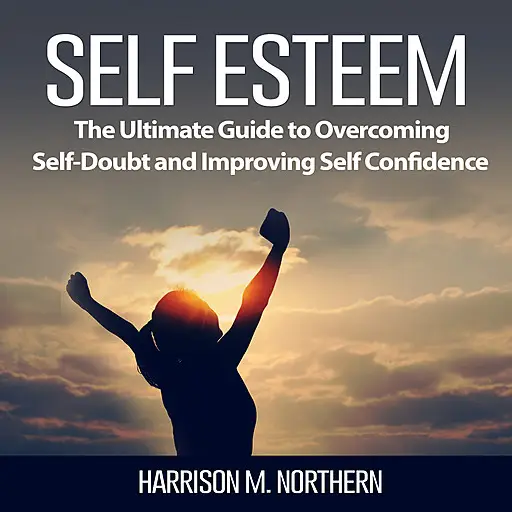 Officers-colleagues told me: “Where are you going? All the money in the business has already been earned, all the paths have been trodden.” Almost none of them supported me. And then, when my business went uphill, they even asked me to take me as a partner.
Officers-colleagues told me: “Where are you going? All the money in the business has already been earned, all the paths have been trodden.” Almost none of them supported me. And then, when my business went uphill, they even asked me to take me as a partner.
Perhaps even now those who are trying to reach a new level, to change something in life, are also dissuaded from this step.
Did you immediately set a big, grandiose goal or was it a chain of goals? nine0011
One of my goals or even values has always been freedom. Despite the fact that I consciously decided to become a military man, and there is much less freedom in this area than those who just go to work, at that time this freedom was expressed in the ability to travel and earn more.
And then I realized that I can earn money myself, without being subordinate to anyone. Do what you want, create your financial freedom. It was both a value, and a goal, and a motive.
nine0002 And now fundamental for me is a certain level of freedom, the ability to determine for myself what I want to do.
From the moment I retired from the military, I never worked for anyone else. Yes, he followed some leadership guidelines, but he no longer obeyed anyone.
And I really wanted to earn money for an apartment and a car on my own, and I also achieved these goals: I bought an apartment in the city center and two cars.
Have your goals changed as your business has grown? nine0011
Yes, of course.
At first I ran a traditional business related to goods: I bought and sold. Then I realized that the intellectual business is more interesting to me. New technologies appeared, the Internet, and I got into the information business.
Have you personally experienced self-sabotage? How did it manifest itself?
There were difficulties, but I was interested, everything inspired me. I did everything with pleasure.
Once there was a crisis moment: when I was just starting to develop a business, the situation on the market changed. At that time, I went through a training related to personal transformation, personal growth - some of my values \u200b\u200bchanged inside, and the situation outside changed. nine0005
At that time, I went through a training related to personal transformation, personal growth - some of my values \u200b\u200bchanged inside, and the situation outside changed. nine0005
All together it grew into one general crisis: I no longer wanted to deal with the old, and the new had not yet taken shape. Didn't know what to do. The new activity has not yet generated income. Financial difficulties arose - I had to sell an apartment, a car.
It turned out that when my old stereotypes and values collapsed, everything that was based on them collapsed. And the new one has not yet been built. It was a really difficult period.
What helped, supported at that moment? Didn’t want to give up everything, return to the usual, already familiar way of life? nine0011
My core values helped: freedom, development, moving forward, creating a better future for myself and my family, my environment. Of course, there were people nearby who always supported me, relatives, friends.
By that time, I had already clearly formulated my global goal in life: "I help people increase their self-confidence."
In difficult moments he switched to helping others. I shifted the focus from myself to other people. There were situations where you had to think about how to get out yourself. nine0005
There were crises in my life, but there was no regret about what I had done and no desire to go back during these periods. There were ups and downs, but I never had the feeling that I was not living my life.
How did you find the strength to move forward despite the difficulties?
Sometimes life itself pushed me forward. In a crisis situation, I simply could not sit in a comfort zone. When everything falls apart, either do something or give up. I was not going to give up and always looked for a way out that matched my values and goals. nine0005
Do you think that self-sabotage is just “outbursts” at difficult moments of work, or is it a state that needs to be constantly overcome?
Self-sabotage is always there.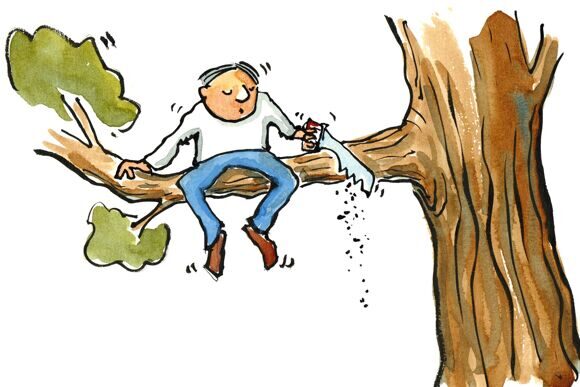 For some, this is expressed more globally and the person decides not to do anything at all. I am constantly moving somewhere, but some moments of self-sabotage are also present. For example, I want to get up early, but it is not always possible. I need to record a video, and I turn on self-sabotage. With the video, it helps me that I have a YouTube manager, and he reminds me of this, drives me, follows. nine0005
For some, this is expressed more globally and the person decides not to do anything at all. I am constantly moving somewhere, but some moments of self-sabotage are also present. For example, I want to get up early, but it is not always possible. I need to record a video, and I turn on self-sabotage. With the video, it helps me that I have a YouTube manager, and he reminds me of this, drives me, follows. nine0005
Now there are many tools to help. I listen to recordings of international coaches - they help me too. If I feel that at some point I turn on self-sabotage, and I understand that, most likely, I will abandon this matter, then I turn to specialists.
Can self-sabotage be called a point of growth?
Absolutely! If I sabotage something, and then, having overcome sabotage, I do it, then a lot of energy is born in me.
Didn't want to, evaded, delayed the moment, and then did it - cool! nine0005
The transformation of sabotage eventually turns into a good amount of energy, and if this energy is directed further into the cause, then more difficulties can be overcome.
Do you agree that when a person finds his way, he is no longer stopped by difficulties?
Of course. After all, finding your way is the most difficult thing. I did not know where to move, and at some moments I seemed to lose myself. There were guiding stars inside, but it was not clear how to go to these stars, in what capacity, in what format. Then there was no coaching, consulting: no one could give me a session to get out of a crisis situation. nine0005
When I got to know coaching, I realized how great it helps. I myself at that moment was not in the best shape, I was in the next search for myself. Everything was fine, it was relatively good. But this "good" was not entirely mine.
Now I am moving in the direction that I am interested in, in which I want to move, but I continue to look for new options, a new better version of myself. And this process goes not through pain and resistance, but through awareness. I give myself the opportunity to relax, take a breath, or, conversely, consciously get involved in the process to the maximum. This is already a professional level - unlike the past, amateurish. nine0005
This is already a professional level - unlike the past, amateurish. nine0005
During this time, you must have developed special techniques to deal with self-sabotage?
Previously, I overcame this state intuitively, found people who can act as a mentor, suggest, direct.
And I think that life itself is built in such a way that there are always tools to eliminate sabotage. It's just that the quality and level of these tools can be different. The main engine against self-sabotage is precisely those desires, those goals that really inspire a person. If the goals are strong, then the person will find the tools to overcome self-sabotage. And if the goals are uninteresting, then a person from the very beginning will begin to sabotage. To make goals interesting, they need to be fired up. nine0005
And how to kindle them?
The simplest thing is to visualize, to make a collage of pictures depicting targets. Then go where you will be closest to the goal, get into the environment of this goal, do something corresponding to this environment. For example, get on a test drive of a car that you want to drive. If you want an apartment, go and look at this apartment. If you want to dress in expensive things, go to expensive stores and try on these things. You need to kindle the desire for the life you want to live, to taste it, to touch it. Then you understand if you really need it. Perhaps you only think that it is necessary, but in fact it is not at all. nine0005
For example, get on a test drive of a car that you want to drive. If you want an apartment, go and look at this apartment. If you want to dress in expensive things, go to expensive stores and try on these things. You need to kindle the desire for the life you want to live, to taste it, to touch it. Then you understand if you really need it. Perhaps you only think that it is necessary, but in fact it is not at all. nine0005
What is your favorite self-sabotage technique?
Easiest - Sedona Method But you need to delve into it, train it.
Why does a person get sabotaged and not do what he should or what he was going to do? Because at this moment feelings are born in him that interfere with him. With the help of the Sedona method, he begins to transform these feelings, understand them, and then manage them. His level of awareness rises. nine0005
And when a person is aware of the action at the level of “oh, this is important, it will help me, lead to a better version of himself”, then it becomes easier for him to overcome the resistance that arises.
Here it is important not to understand the reason logically, but to be aware of it, to accept it. A deeper level of awareness is born through training.
There are other ways, but this method is the best that can be learned quickly and brought into habit.
Another way to combat self-sabotage is to do something not only for yourself but also for others . I conduct trainings, trainings, but if I conducted them only in order to earn money, I would not be enough. I spend them so that people change their lives, come to success. And this is already a higher motivation.
When you do something and understand that not only you will benefit from it, but your family, your students, colleagues will benefit, then the strength to overcome self-sabotage becomes greater.
I am a supporter of an individual approach. The method chosen depends on the level of the individual. It is important for someone to do something for others, but there are people who have not yet matured for this. This is neither bad nor good. But if we take the environment of coaches and consultants, then for this audience it may already be important. nine0005
This is neither bad nor good. But if we take the environment of coaches and consultants, then for this audience it may already be important. nine0005
You have been working with people for a long time and have observed the process of human growth more than once. And were there those who, if I may say so, were immune to the self-sabotage virus?
I don't think there are such people. Because it is part of the natural process of growth and development. It's just that there are people who get over it very quickly. We look at them, and it seems to us that everything in their life is developing easily and smoothly. This does not mean that they do not have sabotage. This means that they found the tools and learned how to use them without anyone noticing. nine0005
When an Olympic athlete sets another record, we only see how easily and gracefully he does it. Numerous workouts, injuries, breakdowns that he overcame to show off his skills remain behind the scenes.
The same thing happens to a person who quickly overcomes self-sabotage.
What would you advise our readers to do when they fall into the trap of self-sabotage?
It is important to realize that self-sabotage is normal. Don't blame yourself for it. These negative feelings reduce energy, create low vibrations, even lower than apathy, when a person does not want to do anything at all. You need to take this calmly, observe this state and learn to change it. nine0005
There are two aspects to self-sabotage. The first has to do with motivation. Second technical.
For example, if a person decides to get up early in the morning, then how strong his motivation plays a role. But if he didn’t start an alarm clock in the evening, then he would simply oversleep, no matter how motivated he was.
Need to consider both factors, to understand where the failure occurs? What is a person doing
wrong? Where needs to be corrected? And, of course, you need to constantly increase your motives, the value of the action that you periodically sabotage. And from a technical point of view - to create specific steps that will help you go from the point when a person wanted to receive something to the point of completing this task. nine0005
And from a technical point of view - to create specific steps that will help you go from the point when a person wanted to receive something to the point of completing this task. nine0005
Is there a quick universal recipe, inspirational phrase or quote that can quickly get a person out of this state?
The motto of the students in the "Empire of Coaches" is the phrase "Act boldly and decisively!"
And I personally used to be very inspired by the phrase "They believe in those who believe in themselves."
If you regularly increase your faith in yourself, then others will also begin to believe in you. If the motive to become a leader, an expert in something is important for a person, then, accordingly, you need to believe in yourself as an expert, as a coach, and so on. nine0005
Our center has a coaching program “Swift Breakthrough to Results in 90 Days”, where participants receive unique tools that increase self-confidence and help them cope with self-sabotage.
We thank our hero for the story about how he managed to achieve success and what techniques can be used to avoid long pauses in moving forward. We are waiting for your stories about what helps you personally stop sabotaging important actions in the growth and development of projects and personality. nine0005
Konstantin guardian, author of the project “Empire of Coachy”
Talked Elena Samchuk, the interpretation of the project “Mom-Reter”
There are already more than 20 thousand of us on the social network. Join us to receive business development tips and useful links
* If social networks Facebook, Instagram are mentioned in the text, we notify: the activities of the Meta company (Facebook, Instagram) are recognized as extremist and are prohibited on the territory of the Russian Federation. nine0005
Be humble, ask for help and take your time: how to stop self-sabotage and survive
The world does not revolve around you, trying to guess the future is meaningless, and feeling happy is not at all necessary. Realizing these unpleasant facts, you can break out of the trap into which we drive ourselves when, instead of taking concrete actions to improve our lives, we spend energy on anxiety, resentment and frustration. We tell you how to gain psychological stability and stop self-sabotage
Realizing these unpleasant facts, you can break out of the trap into which we drive ourselves when, instead of taking concrete actions to improve our lives, we spend energy on anxiety, resentment and frustration. We tell you how to gain psychological stability and stop self-sabotage
Brianna Wiest's book on how to resist the overwhelming need to put a spoke in your own wheels is one of Amazon's best-selling self-help books. Wiest, a former regular freelance writer for American Forbes, is a specialist in emotional intelligence, psychology and self-improvement.
Finished reading here
In the book “From self-sabotage to self-development. How to Conquer Negative Intrusions on the Path to Happiness” (in Russian by Mann, Ivanov & Ferber at the end of April) Brianna Wiest explains where our drive for destructive self-destruction comes from and what we can do about it to change our lives for the better. Forbes publishes an excerpt. nine0114
Forbes publishes an excerpt. nine0114
Finding inner peace
“Now it's not about sitting in the lotus position and waiting for wisdom to descend upon you. We will discuss the need to make a rather difficult decision: not to ignore the discomfort and decide to change. As clinical psychologist and writer Gail Brenner notes, “Internal warfare is exacerbated by constant resistance: we refuse to experience our own feelings, we don’t want others to do what they do, we don’t want events to unfold according to their own logic. Resistance forces us to change our personal history as well, so that our plans will finally come true. She believes that inner peace is the only thing that is available to us, because everything else is definitely beyond our control. nine0005
Another amazing way to find inner peace is to constantly remind ourselves that all fears and anxieties are the product of the mind, which must constantly identify threats and protect us. True happiness is being present in the present moment. If this is hard to believe, do the following exercise.
True happiness is being present in the present moment. If this is hard to believe, do the following exercise.
- Write down everything that caused and causes you serious anxiety. Mentally transport yourself as far as possible into the past, remember all the reasons for excitement in every detail. nine0214
- Make a list of all the difficult times you swore you would never do it again.
- Now list all the moments when you truly experienced happiness and peace.
I guarantee that the first list will make you smile, because you will see that for many years you constantly worry about something, although your worries are mostly unfounded. The second list will also help you breathe more freely. You will see that you once thought that your life was full of torment and fear, but now you have not remembered these dangers for a long time. In compiling the third list, you will probably realize that the feeling of happiness almost never arises simply because everything has become perfect. It comes when you manage to just enjoy the moment and listen to yourself. nine0005
In compiling the third list, you will probably realize that the feeling of happiness almost never arises simply because everything has become perfect. It comes when you manage to just enjoy the moment and listen to yourself. nine0005
Detach your worries
Most of us get addicted to drugs or avoidance behavior quite easily. About the same effect provides anxiety - the main defense mechanism that we use to distract ourselves from the really important things.
Over time, you begin to believe that if you worry, you will definitely ensure your safety. You get used to thinking that by mentally replaying apocalyptic scenarios over and over again, you are preparing for their onset. This is absolutely not true. In fact, you are just wasting your energy, imagining situations that you yourself have come up with. If you are hypersensitive to all these fears and frightening prospects, you run the risk of actually being in such circumstances simply because you prefer to avoid reality or overreact. nine0005
If you are hypersensitive to all these fears and frightening prospects, you run the risk of actually being in such circumstances simply because you prefer to avoid reality or overreact. nine0005
To find inner peace, you need to turn to your own deep wisdom. Nothing needs to be created, explained, imagined or achieved here. This wisdom is already available to you, you can always rely on it. It is only important to make the right decision.
Related material
Remember that sensations do not always correspond to facts
The most difficult thing is to face the need to decide which feelings give truthful information and are based on intuition, and which are born from fears and ego. You probably often hear that at the level of intuition, each of us knows the truth, and that feelings are a reflection of reality, and that if you look into the depths of your soul, you will find wisdom there that will guide you through life . .. It is very tempting to admit that everything feelings and sensations are not only real, but even predict the future. nine0005
.. It is very tempting to admit that everything feelings and sensations are not only real, but even predict the future. nine0005
Your feelings do not predict anything. They only reflect the current state of mind. It's like a nightmare: there are no monsters, but the dream is a metaphor for what you are experiencing while you are awake. Many of us fail to find inner peace precisely because we can’t figure out what is real: fears or peace.
It is important to remember that only the feeling of peace points us to the truth. Feelings do not warn of future events. They simply demonstrate your current state and mood and suggest how best to respond to what is happening. Fear is needed so that you hide and can avoid danger. All this is fast. The feeling of inner peace reminds you that everything will be fine, because it has always been like this ... and will be, no matter what. nine0005
nine0005
Gaining mental resilience
Whoever you are and whatever your calling, without mental resilience you will not be able to fulfill your potential.
Psychological stability is not an innate trait that either exists or not. Oddly enough, it can be more difficult to acquire if you do not encounter serious difficulties. Usually, it is those who have experienced particularly difficult circumstances that are forced to develop high psychological resilience. Resilience is both a process and a practice. Here's where to start. nine0005
Make a plan: it's easier to win this way
Mentally stable people know how and love to plan. They always think a few steps ahead. Getting ready. Do what is most beneficial in the long run. It may seem that this approach makes it difficult to see the current situation, but this is not at all the case. You lose touch with reality when you worry or run the same thoughts in your head. If you are constantly worrying, it is precisely because you do not have a plan to deal with everything that you are so afraid of. nine0005
Getting ready. Do what is most beneficial in the long run. It may seem that this approach makes it difficult to see the current situation, but this is not at all the case. You lose touch with reality when you worry or run the same thoughts in your head. If you are constantly worrying, it is precisely because you do not have a plan to deal with everything that you are so afraid of. nine0005
Think of something that doesn't scare you. Do you know why you are not afraid? Because you have a plan in case it does happen. You can afford not to waste time on worries and focus on the present moment.
Whether it's about achieving financial stability, improving relationships, finally starting therapy, finding a new job, building a career in a new field, if you don't have a plan, you'll keep running into new problems.
Related material nine0005
Be humble: the world does not revolve around you
It may seem that everyone around thinks only of you, evaluates you, condemns you, determines your status. No, it's not. Social media makes us all feel like some kind of celebrity within our own social circle. It seems to us that those around us do nothing but monitor and evaluate our every step.
No, it's not. Social media makes us all feel like some kind of celebrity within our own social circle. It seems to us that those around us do nothing but monitor and evaluate our every step.
In a few decades you will be gone. A new family will live in your house. Your work will be done by someone else. Children will grow up; your task will be completed. This thought should not cause depression - it should inspire. nine0005
No outsider thinks about us day and night, as we sometimes think. They mostly think about themselves. If you suddenly feel embarrassed about the fact that you allowed yourself to jump into the store in sweatpants, remember that no one cares about this and no one pays attention to your appearance. As you begin to worry about accomplishment or lack thereof, please remind yourself that for the most part, no one cares. And so it is in almost every area of life.
No one evaluates or judges you the way you do. For the most part, people are guided by the first impression. Stop thinking that everything in the world revolves around you, like around the Sun. You are not at the center of the world. Even within the framework of your life, not only you personally are important. The sooner you get rid of the feeling that every step you take is being judged, the easier it will be to relax.
Ask for help: you can't know everything
We live in a society where specialization is accepted. People go to school, then study and become masters of something. Then they try to sell their skills (knowledge) and buy the skills (knowledge) of others. You cannot know and be able to do everything in the world. nine0005
You don't have to be a financial expert and you can hire a consultant to fill out your tax return or talk about investments. You don't have to be a skilled cook, so you can buy a recipe book or ask your mom for help. You don't have to become a world-class coach, but you can sign up for one of them. You don't have to understand the complex subjects of psychology and neuropsychology - that's why you go to a psychotherapist and figure out how to improve your condition. nine0005
You don't have to be a skilled cook, so you can buy a recipe book or ask your mom for help. You don't have to become a world-class coach, but you can sign up for one of them. You don't have to understand the complex subjects of psychology and neuropsychology - that's why you go to a psychotherapist and figure out how to improve your condition. nine0005
You cannot know and be able to do everything in the world. You don't have to be equally good at everything - there are people you can hire or learn from. Be kind to yourself, focus on what you are good at. Leave the rest to someone else.
Figure out what you don't know and don't fall into the trap of false dilemmas
We experience increased anxiety primarily because we are carried away by the so-called false dilemmas, that is, we look at the future from an “either/or” position. This is one of the cognitive distortions. You ignore a lot of possible scenarios and focus on two, both of which are extreme and neither of which are likely. nine0005
This is one of the cognitive distortions. You ignore a lot of possible scenarios and focus on two, both of which are extreme and neither of which are likely. nine0005
- If I lose my job, then I am a loser. False.
- If this relationship ends, no one will ever love me again. False.
- If this terrible event happens, I won't be able to live on. False.
Anxiety arises from logical traps when a gap appears in your reasoning. You jump between events and conclusions, and while experiencing strong emotions, decide that your reasoning is correct. You become accustomed to thinking in terms of false dilemmas, which is not only ineffective, but also frightening enough that you are unable to cope with real events. nine0005
nine0005
Stop guessing the future: this is also a cognitive distortion
We humans are most afraid of the unknown, and therefore we really want to find a way to predict the development of at least some events. But magical thinking is thinking about what your premonitions tell you about something; that you "just know" what will happen in the future; that your fate is somehow predetermined once and for all - deprives you of psychological stability.
You are, figuratively speaking, a passenger, although you should be driving. Trying to find psychic abilities in yourself and look at the world through their prism, you begin to extrapolate: you take some sensation or impression and, on this basis, make predictions about your whole life. Not only is this approach wrong, it breeds self-fulfilling prophecies. nine0005
nine0005
Stop trying to predict the unknown and start investing in creating what you can do. Then life will improve.
Take responsibility for all (absolutely all) outcomes
On the scale of life, the most important outcomes are those that you have almost complete control over. Of course, it is easier, and not so scary, to pretend to be just a gear in a complex mechanism, but this does not correspond to reality at all.
If you tried your best to become more productive, paid attention to health and material well-being, developed relationships and strived for greater awareness, your life would be different. nine0005
In all of these areas, without exception, you can make a difference, even a small one. There are things in life beyond our control, but if you focus on them, you can miss something important. For the most part, your life is the result of your actions, deeds and decisions.
There are things in life beyond our control, but if you focus on them, you can miss something important. For the most part, your life is the result of your actions, deeds and decisions.
Related material
Learn to manage your mood by working with complex emotions
You don't have to feel happy all the time. By forcing yourself to do this, you do not solve the problem, but exacerbate it. Psychological stability requires not the ability to radiate positive always and everywhere, but the ability to experience complex emotions: grief, rage, sadness, anxiety, fear. Until we learn to pass them through ourselves, comprehend and draw conclusions (or at least calmly observe them), we will accumulate them. nine0005
As a result, anything around can become a trigger and provoke a tantrum. You can, of course, think that the main thing is to have endurance. In fact, the main thing is to be able to cry when you are experiencing grief; get angry when faced with injustice; be ready to solve problems. This is an adequate response to emotions, and it is he, and not an impulsive response, that determines psychological stability.
You can, of course, think that the main thing is to have endurance. In fact, the main thing is to be able to cry when you are experiencing grief; get angry when faced with injustice; be ready to solve problems. This is an adequate response to emotions, and it is he, and not an impulsive response, that determines psychological stability.
Stop thinking about the past and focus on how to fix things
Think about what went wrong, draw conclusions from this, figure out how you can compensate for the loss or learn how to behave differently in such situations. And then let it all go.
You will hold on to the past until you learn to draw conclusions from it. By mastering this skill, you will be able to use your experience in new situations and create conditions to survive them with dignity. If you pay too much attention to the past and not to the present or plans for the future, you will not be able to move on.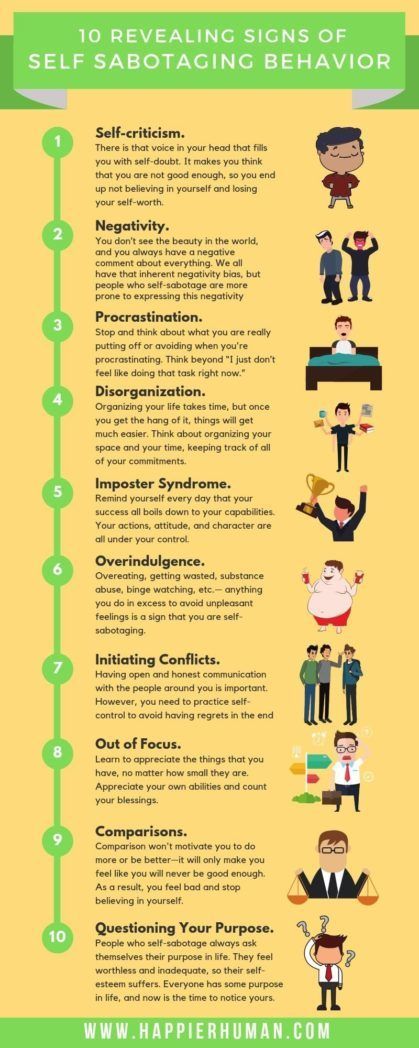 nine0005
nine0005
If you feel like you have seriously let yourself down, then it is especially important to act quickly and get a different experience. Life has not ended. You haven't made a fatal mistake, but you definitely will if you don't let go of the past and start trying again.
Speak: in our thoughts everything is more complicated than it really is
If it seems that you are completely bogged down in thoughts, feelings, fears, try talking to someone. It is better if it is a professional psychologist or a reliable friend. If no one is around, talk to yourself: talk about all the ideas and considerations, as you would tell a real interlocutor. nine0005
Sometimes we need an outsider who can listen objectively and help deal with a particularly difficult situation.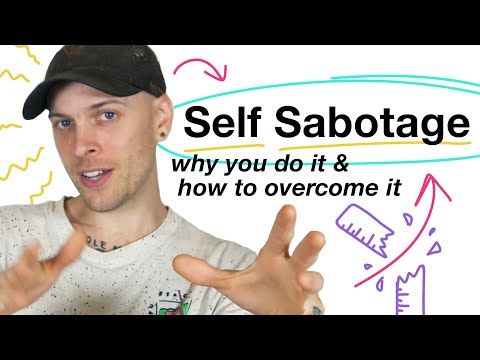 If you do not give vent to heavy thoughts, keep everything in yourself, you can only aggravate the matter. When we find a way to express our emotions and thoughts, we often feel lighter and find the strength to move on.
If you do not give vent to heavy thoughts, keep everything in yourself, you can only aggravate the matter. When we find a way to express our emotions and thoughts, we often feel lighter and find the strength to move on.
Related material
Don't rush: you don't have to figure everything out right away
As a rule, growth doesn't come in fits and starts. It goes gradually, in small steps, because as we grow, we expand and change our own comfort zone. We adapt to a new life, but if the changes begin to occur too quickly and often, we risk in fear of returning to the old, familiar and familiar. The most effective and healthy approach to change is slow. nine0005
If you need immediate positive reinforcement, make it your goal to take one tiny step a day. Over time, things will get more confident, and one day you will see how far you are from the point where it all began.
Over time, things will get more confident, and one day you will see how far you are from the point where it all began.
Use triggers as signals of unhealed wounds
Triggers do not just form: they indicate either areas of greatest vulnerability or points of growth. If we learn to look at triggers as important signals, we will notice that they point to those areas in our life where restoration, healing, change are needed. It turns out that triggers not only cause pain, but also benefit. nine0005
Ignoring problems is pointless. Ignoring wounds is wrong. Each problem and wound will have to be considered, processed, conclusions drawn from each, and then behavior corrected. So you increase not only psychological stability, but also the quality of life in general.
Appreciate the discomfort
Discomfort is the best gift that life gives you.








